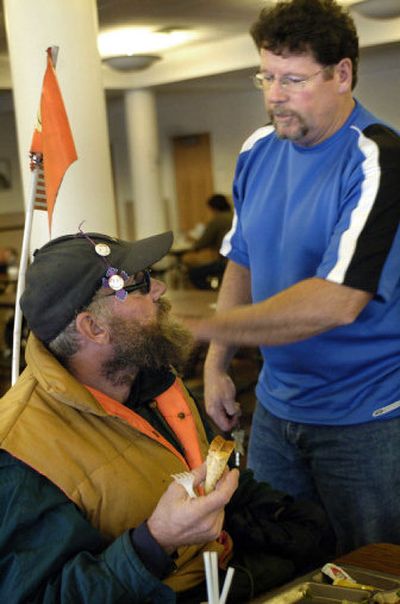Jerry lives in service to the poor

The man has the thick eyelashes of a young boy, and they give his face a childlike gentleness. He sits with five others in the chapel in the House of Charity, a downtown Spokane shelter.
The man is frustrated. He wishes he could walk out into the street and get hit by a truck. Jerry Schwab, who has organized the morning’s prayer time, begins to respond. The man interrupts him, gentle no more.
“You don’t get it! You have a home, a family, a life to go home to. You have a job. I’ve got nothing!”
In a quiet voice, Jerry tells the man he does not understand his experience. No one can fix other people, Jerry says. But they can pray together and listen to each other’s stories.
The tense moment passes, and I feel awe at Jerry’s ability to defuse the situation.
Jerry is 51; I’ve known him for 30 years, since our Gonzaga University days together. He has a master’s degree in counseling psychology and a doctorate in educational leadership. He works at a paying job, as an intervention specialist at Kahlotus and Washtucna school districts, just two days a week. The other three days he spends at House of Charity.
During Hurricane Katrina, when the poor washed into our living rooms on TV news reports, some people opened their homes and pocketbooks to women and men on society’s margins. But Katrina is off the front pages now; compassion fatigue has settled in.
Jerry understands what it takes to maintain a long-term commitment to the poor, because he’s living it.
“My role here is to be present, to respond in compassion,” Jerry says. “People don’t want answers. They don’t want to be fixed. I started in this thinking I could change people. I don’t think that way anymore.”
Jerry’s days begin at about 8:30, in the chapel. Chapel is not mandatory at the House of Charity, which is run by Spokane Catholic Charities. Some days, Jerry is joined by just one other person. Other days, as many as 10 straggle in. People begin by checking in with their stories.
“I listen to the most amazing stories,” Jerry says. “I have no idea if there is truth in them. But people’s stories are what define them, and a lot of people have never had their stories heard. Progress for people is when their story matches what they truly are inside.”
After check-in, people pray for themselves and one another. The prayers are often profound. One man improvises on the Lord’s Prayer with these lines: Forgive us our trespasses. Forgive us our fabrications.
After chapel, Jerry drinks coffee with clients and listens to their stories. He eats lunch with them and listens some more. One recent day, over meat-and-potato stew, Jerry chatted with Mike, a homeless activist.
“People treat us like animals,” Mike told me. “But Jerry is friendly.”
Mike is a creative dreamer. He plans to barbecue a case of hot dogs on the street one afternoon, and invite rich people to his version of the Lord’s Supper.
Jerry also dreams big. He’s researching the possibility of securing a downtown building where those with means will live in community with poorer residents, building relationships across the economic divide.
Jerry is open with the men and women at the House of Charity. He tells them how edgy, even frightening, the place can feel to him some days.
“If I entered this room and pretended I had it together, they would see right through it and flatten me.”
Each Tuesday morning, Jerry is joined in the chapel by one of his best buddies, Leo Richardson, who owns a successful real estate appraisal firm in Spokane.
“I am feeling a strong need to make a connection with folks I can learn from, folks who are different from me,” Leo says.
Leo first met Jerry in 1972. Is he surprised at Jerry’s life now? Not at all, Leo says, “Where his heart was back in college, I could see this path for him.”
It’s not a path everyone can, or should, walk. In my Wednesday column, Jerry will offer guidelines to others in our community who see a similar path but feel unsure how to make the first step toward it.